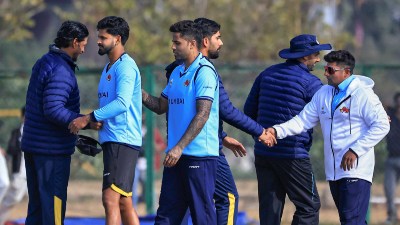Olympic medallist team boss faces trial for doping
Berlin, May 3: The longtime head of East Germany's powerhouse Olympics programme went on trial on Tuesday on charges that he injured super...

Berlin, May 3: The longtime head of East Germany8217;s powerhouse Olympics programme went on trial on Tuesday on charges that he injured super athletes by feeding them steroids without their knowledge, ignoring health risks in the pursuit of more gold medals.
Ewald and Hoeppner are charged with 142 counts of being accessory to causing bodily harm 8212; the side effects of performance-enhancing drugs, ranging from excessive body hair and deep voices to liver, kidney and menstrual problems.
Some girls were started on the shots or little blue pills as young as 11, with their coaches instructed to tell them they were taking vitamins, prosecutor Klaus-Heinrich Debes said in opening statements.
8220;They8217;re still so young and don8217;t have to know everything,8221; Debes quoted Ewald as telling his underlings.
Debes said Ewald dismissed objections raised by scientists about possible health risks, accusing them of 8220;cowardice.8221; Ewald told his underlings 8220;everything is allowed8221; to reach the desired performance levels, according to the indictment.
The trial was initially scheduled to last only one day, but presiding judge Dirk Dickhaus said more sessions would be held to hear from Hoeppner as well as several former athletes, 20 of whom have joined the case as co-plaintiffs. Ewald so far has not indicated he would take the stand.
The trial was adjourned after two hours until Friday.
Prosecutors began filing charges against former East German coaches, doctors and others in 1997, using documents and other evidence found in once-secret East German government files after German unification.
About 20 have been convicted and given fines, suspended sentences or both. None so far has had to serve time behind bars 8212; a fact that angered some victims in court.
8220;I really hope for a prison term for Ewald, but there certainly won8217;t be one,8221; said Karen Koenig, a former European champion swimmer. She said she hoped to at least hear an apology from Ewald.
Prosecutors are racing to bring the cases to a close before October 3, the 10th anniversary of German unification, when the statute of limitations for many offenses will expire.
Despite widespread suspicions about East German athletes over the years, few were ever caught in drug tests; files showed East German scientists also devised methods to avoid detection.
But the results of the doping programme that began in the 1970s were dramatic: tiny East Germany, with less than 17 million people, went from 20 gold medals in 1972 to an astounding 40 at the Montreal Games in 1976. East Germans won 11 of 13 events in women8217;s swimming in 1976 and again in 1980.
Ewald, now 73, allegedly initiated the programme and was kept abreast of the results, including the damaging side effects. A member of the Communist party8217;s central committee since 1963, he was president of East Germany8217;s sports federation from 1961-88 and of its National Olympic Committee from 1973 until the country ceased to exist in 1990.
Hoeppner, now 66, was the country8217;s top sports doctor. Prosecutors say he ordered the steroid preparations himself and distributed them to the sports doctors and coaches.
- 01
- 02
- 03
- 04
- 05






























